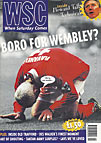 Mike Ticher reminisces about Chelsea's man who turned down the chance to play Brazil
Mike Ticher reminisces about Chelsea's man who turned down the chance to play Brazil
Alan Hudson played his last game for Chelsea in a 1-0 home defeat by Liverpool in December 1973. That match also led to the departure of Peter Osgood as Dave Sexton’s team self-destructed in a welter of bruised egos, booze-ups and squandered talent.
Most members of that team eventually came back in one guise or another, including Osgood, who scored on his second debut in December 1978, inspiring Chelsea to a 7-2 defeat at Middlesbrough. Hudson’s reprise is less well-remembered, but because it came precisely at the turning-point in Chelsea’s recent history, his brief cameo seemed almost stage-managed to remind the club of the disastrous mistakes of the past.
Astonishing though it seems now, in 1982-83 Chelsea drew five home gates of less than 8,000. Only a Clive Walker goal at Bolton in the penultimate game saved them from relegation to the third division. Ken Bates had expelled the vainglorious Mears family from the boardroom barely a year previously. Huge areas of unneeded terracing were rotting behind corrugated iron sheets.
Into this disaster zone stepped Hudson, the ghost of Chelsea past, signed from the Seattle Sounders in the summer of 1983. His return coincided with the arrival of five newcomers – Pat Nevin, Kerry Dixon, Nigel Spackman, Eddie Niedzwiecki and Joe McLaughlin – and yet another of the old guard, John Hollins. But while they all went on to play substantial roles in the revival of the club, Hudson moped on the sidelines until his mentor Tony Waddington took him back on loan to Stoke in February of the following year.
Hudson always had a talent for rubbing people up the wrong way. He it was who turned down the chance to play for England against Brazil in 1978, on the grounds that Ron Greenwood only called him up as a replacement, instead of including him in the original squad. At Chelsea, inevitably, he quickly fell out with Bates and alienated the rest of the players by refusing to accept the roles offered him by manager John Neal.
According to Kerry Dixon, Hudson and Micky Droy used to retire to the bar at half-time when they weren’t selected (which was always) and grumble about how things had changed since their day. “The behaviour of Hudson and Droy threatened to destroy any semblance of team spirit,” Dixon later wrote in his autobiography. Hudson was a walking advertisement for the attitudes that had got the club into such a mess in the first place.
So it was that Chelsea’s midfield relied on the more prosaic qualities of John Bumstead, Tony McAndrew and Spackman in this promotion-winning season. After he left, Hudson was quick to slag off his former club in the tabloids, and simultaneously nursing a drink and a grievance remains his best act. In Rob Steen’s book The Mavericks (which might have been more aptly titled The Wasters), the author meets Hudson in a pub on Cup Final day 1994. “Alan doesn’t even want Chelsea to win,” he realizes. “Glenn Hoddle or no Glenn Hoddle, he denounces them as a collection of ‘scufflers’.”
Yet until last November, when he got involved in a scuffle of his own with Terry McDermott in the tunnel at Stamford Bridge, Hudson was still invited back to regale the punters with his after-match views and reminisce about his all-too-brief heyday. No doubt he’ll be back again before too long. Why do they tolerate him? Some might call it nostalgia. Personally I think the club realized long ago that it was better to keep Hudson around as a warning of what happens when you let indisciplined, flash gits run the show on and off the pitch. In 1983 to be exact.
From WSC 122 April 1997. What was happening this month